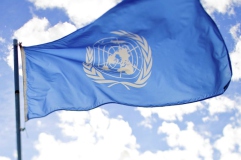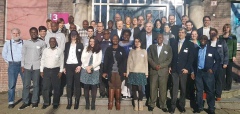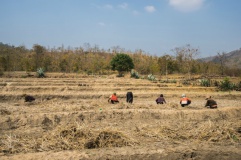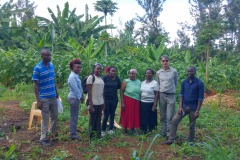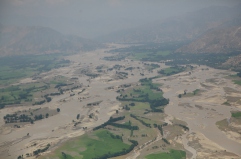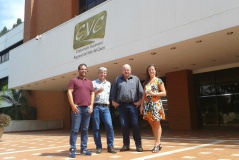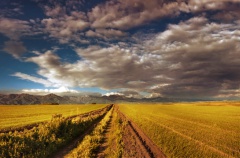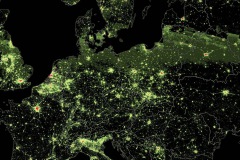Auteur: Martijn
22 maart 2018
FutureWater onderzoek aangehaald in Verenigde Naties rapport
Vandaag, 22 maart 2018, is Wereld Water Dag. In Nederland minder bekend, maar vooral in Afrika en Azië is 22 maart een dag waar water nog eens extra onder de aandacht wordt gebracht. Het thema van dit jaar is “natuur voor water”: de mogelijkheden die natuur biedt voor het oplossen van wereldwijde waterproblemen. In het...
9 maart 2018
ThirdEye maakt drone-technologie toegankelijk voor Afrikaanse boeren
In Nederland spelen drones al een belangrijke rol in de landbouw: vanuit de lucht kunnen zij zeer precies de groei van gewassen monitoren. Hierbij wordt gebruik gemaakt van hoogwaardige sensoren en relatief dure drones. Dankzij deze sensoren kan met speciale software precies worden berekend welke verzorging (bv. water, kunstmest of gewasbeschermingsmiddelen) is vereist. “Een fantastische...
15 februari 2018
New Horizon 2020 project TWIGA officially started
Last week the kick-off meeting took place of a new Horizon 2020 project TWIGA; Transforming Water, weather, and climate information through In situ observations for Geo-services in Africa. The project aims to provide actionable geo-information on weather, water, and climate in Africa through innovative combinations of new in situ sensors and satellite-based geo-data. With the...
1 februari 2018
New IMPREX policy brief: EU’s vulnerability to climate change impacts outside its borders
Climate change is leading to increased water scarcity and drought in many parts of the world. This has implications for the European Union (EU) because a lot of the goods consumed or used in the EU are produced abroad. This makes its economy dependent on water resources from beyond its borders. As part of the...
19 januari 2018
First ThirdEye flying sensor operators trained in Kenya
The ThirdEye project supports farmers in Kenya by setting up a network of flying sensors operators. These operators are equipped with flying sensors and tools to analyse the obtained imagery. In December ThirdEye staff conducted an intensive two weeks flying sensor training at Agricultural Training Centre (ATC) Kaguru, 15 km south of Meru, Kenya. The...
9 januari 2018
Study conducted on water productivity mapping using flying sensors and crop modeling
Recently, FutureWater conducted a study for RVO to test the feasibility of mapping water productivity and yield gaps based on a combination of Flying Sensor imagery and crop water productivity modeling in order to provide plot-level recommendations to farmers. The objective of this pilot study was to achieve plot-level maps of water productivity and yield...
4 januari 2018
Klimaatverandering zal leiden tot een toename in hydrologische extremen in the bovenstroomse gebieden van de Indus, Ganges, en Brahmaputra
Hydrologische extremen, zoals de overstromingen die optraden tijdens de afgelopen moesson periode in Zuid-Azië, hebben een desastreuze impact op de samenleving. Er zijn aanwijzingen dat hydrologische extremen aan het toenemen zijn. Om de nadelige gevolgen van overstromingen te kunnen reduceren, is het noodzakelijk om aanpassingsstrategiën te ontwikkelen, welke kenneis vereisen omtrent welke drijfveren/processen verantwoordelijk zijn...
2 januari 2018
FutureWater started the HERMANA project with two missions to the Cauca Valley Corporation
Two missions in September and October 2017 were held in Calí, Colombia as the starting point of the HERMANA project. During these missions, the HERMANA team, composed by staff from Deltares, FutureWater, and the Dutch Water Authorities, shared Dutch and Colombian experiences in water monitoring, management and governance. Furthermore, they identified the main functional and...
28 december 2017
Higher crop water requirements due to climate change in Kazakhstan
The government of Kazakhstan with financial support of the Asian Development Bank (ADB) is planning to upgrade and rehabilitate its irrigation sector. A detailed Climate Risk and Vulnerability Assessment (CRVA) has been undertaken by a consortium led by FutureWater in 2017. The team collected all available data on the project and had undertaken a rigorous...
20 december 2017
Langste nacht van het jaar steeds minder donker
Op donderdag 21 december hebben we de langste nacht van het jaar, maar hoe donker is het eigenlijk in de nacht? Uit onderzoek met behulp van nachtsatellieten blijkt dat er veel lichtvervuiling is en dat er grote verschillen zijn in vergelijking met 25 jaar geleden. Onderzoekers uit Wageningen hebben met behulp van nachtelijke satellieten kaarten...
